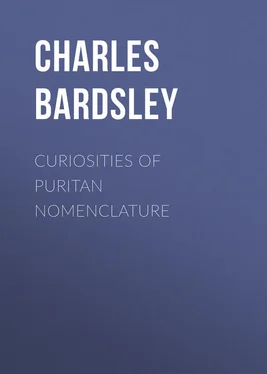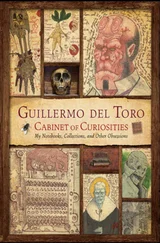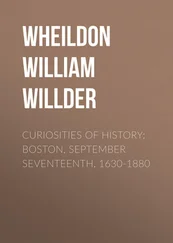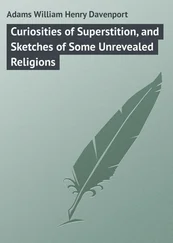Charles Bardsley - Curiosities of Puritan Nomenclature
Здесь есть возможность читать онлайн «Charles Bardsley - Curiosities of Puritan Nomenclature» — ознакомительный отрывок электронной книги совершенно бесплатно, а после прочтения отрывка купить полную версию. В некоторых случаях можно слушать аудио, скачать через торрент в формате fb2 и присутствует краткое содержание. ISBN: , Жанр: foreign_antique, foreign_prose, на английском языке. Описание произведения, (предисловие) а так же отзывы посетителей доступны на портале библиотеки ЛибКат.
- Название:Curiosities of Puritan Nomenclature
- Автор:
- Жанр:
- Год:неизвестен
- ISBN:http://www.gutenberg.org/ebooks/39284
- Рейтинг книги:3 / 5. Голосов: 1
-
Избранное:Добавить в избранное
- Отзывы:
-
Ваша оценка:
- 60
- 1
- 2
- 3
- 4
- 5
Curiosities of Puritan Nomenclature: краткое содержание, описание и аннотация
Предлагаем к чтению аннотацию, описание, краткое содержание или предисловие (зависит от того, что написал сам автор книги «Curiosities of Puritan Nomenclature»). Если вы не нашли необходимую информацию о книге — напишите в комментариях, мы постараемся отыскать её.
Curiosities of Puritan Nomenclature — читать онлайн ознакомительный отрывок
Ниже представлен текст книги, разбитый по страницам. Система сохранения места последней прочитанной страницы, позволяет с удобством читать онлайн бесплатно книгу «Curiosities of Puritan Nomenclature», без необходимости каждый раз заново искать на чём Вы остановились. Поставьте закладку, и сможете в любой момент перейти на страницу, на которой закончили чтение.
Интервал:
Закладка:
It now remains simply to consider the state of nomenclature in England at the eve of the Reformation in relation to the Bible. Four classes may be mentioned.
The leading incidents of Bible narrative were familiarized to the English lower orders by the performance of sacred plays, or mysteries, rendered under the supervision of the Church. To these plays we owe the early popularity of Adam and Eve, Noah, Abraham, Isaac, Jacob, Joseph, Sara, Daniel, Sampson, Susanna, Judith, Hanna or Anna, and Hester. But the Apocryphal names were not frequently used till about 1500. Scarcely any diminutives are found of them. On the other hand, Adam became Adcock and Adkin; Eve, Evott and Evett; Isaac, Hickin, and Higgin, and Higgot, and Higget; Joseph, Joskin; and Daniel, Dankin and Dannet.
The Crusaders gave us several prominent names. To them we are indebted for Baptist , Ellis , and Jordan : and John received a great stimulus. The sacred water brought in the leathern bottle was used for baptismal purposes. The Jordan commemorated John the Baptist, the second Elias, the forerunner and baptizer of Jesus Christ. Children were styled by these incidents. Jordan became popular through Western Europe. In England he gave us, as already observed, Judd, Judkin, Judson, Jordan, and Jordanson. Elias, as Ellis, took about the eighth place of frequency, and John, for a while, the first.
The legends of the saints were carefully taught by the priesthood, and the day as religiously observed. All children born on these holy days received the name of the saint commemorated: St. James’s Day, or St. Nicholas’s Day, or St. Thomas’s Day, saw a small batch of Jameses, Nicholases, and Thomases received into the fold of the Church. In other cases the gossip had some favourite saint, and placed the child under his or her protection. Of course, it bore the patron’s name. A large number of these hagiological names were extra-Biblical – such as Cecilia, Catharine, or Theobald. Of these I make no mention here. All the Apostles, save Judas, became household names, John, Simon, Peter, Bartholomew, Matthew, James, Thomas, and Philip being the favourites. Paul and Timothy were also utilized, the former being always found as Pol.
If a child was born at Whitsuntide or Easter, Christmas or Epiphany, like Robinson Crusoe’s man Friday, or Thursday October Christian of the Pitcairn islanders, he received the name of the day. Hence our once familiar names of Noel or Nowell, Pask or Pascal, Easter, Pentecost, and Epiphany or Tiffany.
It will be observed that all these imply no direct or personal acquaintance with the Scriptures. All came through the Church. All, too, were in the full tide of prosperity – with the single exception of Jordan, which was nearly obsolete – when the Bible, printed into English and set up in our churches, became an institution. The immediate result was that the old Scripture names of Bartholomew, Peter, Philip, and Nicholas received a blow much deadlier than that received by such Teutonic names as Robert, Richard, Roger, and Ralph. But that will be brought out as we progress.
The subject of the influence of an English Bible upon English nomenclature is not uninteresting. It may be said of the “Vulgar Tongue” Bible that it revolutionized our nomenclature within the space of forty years, or little over a generation. No such crisis, surely, ever visited a nation’s register before, nor can such possibly happen again. Every home felt the effect. It was like the massacre of the innocents in Egyptian days: “There was not one house where there was not one dead.” But in Pharoah’s day they did not replace the dead with the living. At the Reformation such a locust army of new names burst upon the land that we may well style it the Hebrew Invasion.
CHAPTER I.
THE HEBREW INVASION
“With what face can they object to the king the bringing in of forraigners, when themselves entertaine such an army of Hebrewes?” The Character of a London Diurnall (Dec. 1644).
“Albeit in our late Reformation some of good consideration have brought in Zachary, Malachy, Josias, etc., as better agreeing with our faith, but without contempt of Country names (as I hope) which have both good and gracious significations, as shall appeare hereafter.” – Camden, Remaines . 1614.
The strongest impress of the English Reformation to-day is to be seen in our font-names. The majority date from 1560, the year when the Genevan Bible was published. This version ran through unnumbered editions, and for sixty, if not seventy, years was the household Bible of the nation. The Genevan Bible was not only written in the vulgar tongue, but was printed for vulgar hands. A moderate quarto was its size; all preceding versions, such as Coverdale’s, Matthew’s, and of course the Great Bible, being the ponderous folio, specimens of which the reader will at some time or other have seen. The Genevan Bible, too, was the Puritan’s Bible, and was none the less admired by him on account of its Calvinistic annotations.
But although the rage for Bible names dates from the decade 1560-1570, which decade marks the rise of Puritanism, there had been symptoms of the coming revolution as early as 1543. Richard Hilles, one of the Reformers, despatching a letter from Strasburg, November 15, 1543, writes:
“My wife says she has no doubt but that God helped her the sooner in her confinement by reason of your good prayers. On the second of this month she brought forth to the Church of Christ a son, who, as the women say, is quite large enough for a mother of tall stature, and whom I immediately named Gershom .” – “Original Letters,” 1537-1558, No. cxii. Parker Society.
We take up our Bibles, and find that of Zipporah it is said —
“And she bare him (Moses) a son, and he called his name Gershom: for he said, I have been a stranger in a strange land .” – Exod. ii. 22.
The margin says, “a desolate stranger.” At this time Moses was fled from Pharaoh, who would kill him. The parallel to Richard Hilles’s mind was complete. This was in 1643. 12 12 This connection of Scripture name with present circumstance ran out its full period. In the diary of Samuel Jeake, a well-known Puritan of Rye, occurs this reference to his son, born August 13, 1688: “At 49 minutes past 11 p.m. exactly (allowing 10′ that the sun sets at Rye before he comes to the level of the horizon, for the watch was set by the sun-setting), my wife was safely delivered of a son, whom I named Manasseh, hoping that God had now made me forget all my toils.” – “History of Town and Port of Rye,” p. 576. Manasseh = forgetfulness. A bishop may be instanced. Aylmer, who succeeded Sandys in the see of London, was for many years a favourer of Puritanism, and had been one of the exiles. His sixth son was Tobel ( i. e. God is good), of Writtle, in Essex. Archbishop Whitgift was his godfather, and the reason for his singular appellation was his mother’s being overturned in a coach without injury when she was pregnant (Cooper’s “Ath. Cant.” ii. 172). Again: “At Dr. Whitaker’s death, his wife is described as being ‘partui vicina,’ and a week afterwards her child was christened by the name of Jabez , doubtless for the scriptural reason ‘because, she said, I bare him with sorrow.’” – Cooper’s “Ath. Cant.” ii. 197.
In Mr. Tennyson’s drama “Mary,” we have the following scene between Gardiner and a yokel:
Читать дальшеИнтервал:
Закладка:
Похожие книги на «Curiosities of Puritan Nomenclature»
Представляем Вашему вниманию похожие книги на «Curiosities of Puritan Nomenclature» списком для выбора. Мы отобрали схожую по названию и смыслу литературу в надежде предоставить читателям больше вариантов отыскать новые, интересные, ещё непрочитанные произведения.
Обсуждение, отзывы о книге «Curiosities of Puritan Nomenclature» и просто собственные мнения читателей. Оставьте ваши комментарии, напишите, что Вы думаете о произведении, его смысле или главных героях. Укажите что конкретно понравилось, а что нет, и почему Вы так считаете.











